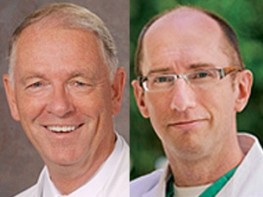Two Neurosurgeons Resign After Trying to ‘Treat’ Patients’ Brains with Fecal Matter

You’ve heard the saying, truth is stranger than fiction – well this story takes the strange and repulsive prize. It seems that two neurosurgeons with long-standing reputations and careers took it upon themselves to ‘treat’ a few of their patients with fecal bacteria injections in order to ‘save’ them.
Under the advice of a colleague, and perhaps under the influence of some medieval impetus to practice very questionable neuroscience on three patients, Dr. J. Paul Muizelaar and Dr. Rudolph J. Schrot, from the University of California-Davis decided fecal matter was a great way to boost immunity. Their patients, one man and two women, all had highly malignant brain tumors diagnosed as gioblastoma. The doctors decided that injecting them with fecal bacteria might jump-start their immune systems.
University officials concluded that even though the doctors had permission from their patients to try this bizarre treatment, they had not gotten the required prior approval from the Food and Drug Administration (FDA). The treatment had only been tested on animals prior to the doctor’s decision to use it on three human patients.
The three patients did not respond well to the treatment. The first developed a condition called sepsis, which is essentially a compromise of our body’s ability to fight any disease. Those who develop sepsis find that their entire body is highly inflamed – something that is not conducive to reducing brain tumors. Usually people only develop sepsis from a severe infection.
This patient died within two weeks of the fecal matter injection treatment. The second patient lived for just over two months. The third, apparently had a little stronger immune system and lived for a year, but died from complications due to the injection thereafter.
After the first patient’s demise, University officials began their investigation. They determined that Muizelaar and Schrot “deliberately circumvented” the schools’ internal ethics policies, “defied directives” from top leaders and dodged federal rules. The most unsettling thing about this story is the fact that there are literally hundreds of ways of boosting the immune system in people without resorting to such Third-Reich-like tactics.
Fortunately, there are still good doctors who work in the system – and look out for the good of the people.

can’t you get a better reporter
Wow!
It gives a whole new meaning to the insult, poophead!
This article is not accurate and I am very surprised at the “closed-mindedness” of the writer. Please perform an extensive research and first educate yourself on a topic before deciding to spread inaccurate information. I am no journalist, but to me it’s common sense. I am considering unsubscribing from this site due to the many inaccuracies and sometimes ignorance (this article is an example) these articles include.
Fecal transplants are now being used among many hospitals and doctors and have been shown to be highly successful particularly for patients with clostridium difficile intestinal infections, which can bevdeadly and in fact kills an estimated 14,000 people per year.
Common sense – you need to do your research. Fecal transplants have nothing to do with injections. The selected fecal material is inserted into the intestinal tract in an attempt to replace “bad” bacteria with “good”. Injecting fecal material into the brain is ridiculous. What do you think the blood-brain barrier is for anyway? Also, if you have a bowel obstruction and the bowel bursts – you have a very slim chance of survival. It will not boost your immune system. I worked at UC for 34 years. Some docs are fantastic, some are egomaniacs and the patients better figure out which is which, or else.
I did do my research and perhaps you need to do a bit more research on your own. I am speaking from experience, which actually helped in my situation. My earlier comments were not regarding injections specifically, but rather the tone of the article that seems to imply that ANY fecal therapies are bizarre. Most people are not familiar with fecal therapies and this article only focuses on a specific case and it does not make a distinction between injections and transplants, therefore potentially misleading those that are unaware of transplants.